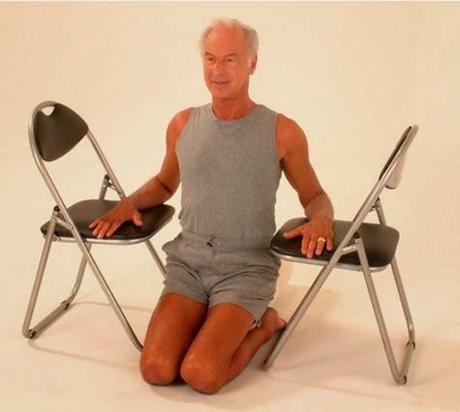
Eric Small, Iyengar Yoga Teacher*
One of the four pillars of our Yoga for Healthy Aging program is focused on improving balance and we have many past posts about how yoga can be beneficial in fostering better balance. I have also written previously about one particular health condition that can dramatically affect a person’s balance, Multiple Sclerosis (MS). I dedicated a Friday Q&A to it a while back and would highly recommend you review that post Friday Q&A: Multiple SclerosisIt turns out that most of the experience of applying yoga to MS symptoms has not been organized into formal scientific studies. Therefore, we call this kind of evidence “anecdotal.” An example of anecdotal evidence is the story of Eric Small’s personal results with yoga and MS that I wrote about in my post Friday Q&A: Multiple Sclerosis. The fact that so far there has only been anecdotal evidence does not mean that students with MS have not noted improvements in different aspects of their illness when regularly practicing yoga, but until now no one had done a focused study on MS. Now I’m happy to let you know that a study sponsored by Rutgers University has just recently been completed that demonstrated improved symptoms for MS patients who participated in a yoga program for eight weeks. And although the published version of this study is not presently available, an early press release shares some of the findings (see Yoga Relieves Multiple Sclerosis Symptoms).Interestingly, the study will be formally presented at the upcoming Conference on Yoga Research in Boston in two weeks! The authors note that MS “…can cause poor coordination, loss of balance, slurred speech, tremors, numbness, extreme fatigue and problems with memory and concentration.” The exciting findings of the study are that after eight weeks of participating in the study, “those who participated were better able to walk for short distances [for] longer periods of time, had better balance while reaching backwards, fine motor coordination, and were better able to go from sitting to standing. Their quality of life also improved in perceived mental health, concentration, bladder control, walking, and vision, with a decrease in pain and fatigue.”And what exactly did the study participants—all women—do? “For 90 minutes, twice a week for two months, they practiced techniques and exercises that would improve their posture, help to increase stamina, and teach them how to relax and focus.”And because the women had different symptoms and severity of challenges, the practices were modified to address these differences. “The yoga practices were done by the women in the study sitting, standing, or lying on yoga mats, and using metal folding chairs situated close to the wall to provide them with more support.” I am so pleased to know that the researchers addressed that yoga is not a one-size-fits-all approach to addressing balance or any of the other issues that MS patients deal with. And one of the study participants interviewed felt that the group dynamics and camaraderie also seemed to be a positive factor for her. This is a sentiment I hear from my regular students as being a powerful motivator for sticking with their yoga practice.The downside to the new study is that it only enrolled 15 students (bigger numbers allows for stronger and more confident conclusions), they were all women (although MS affects women three to four times more often than men, it would be helpful to have had a few men included), there was not control group (MS patients who were given standard mainstream treatments but no yoga) to compare with, and there was no long-term follow-up. However, like most yoga studies that are done these days, this one was called a “pilot study,” so the findings are encouraging. But this pilot study really needs to be followed up with study of a much larger group of MS patients to give us those more meaningful conclusions. The authors hope that such a large future study would allow them to be able to prescribe yoga for MS patients with moderate disability. In any case, this study is step in the right direction! Subscribe to YOGA FOR HEALTHY AGING by Email ° FollowYoga for Healthy Agingon Facebook

